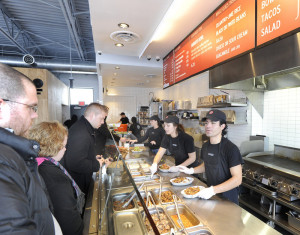Ronald L. Doering, a past president of the Canadian Food Inspection Agency and currently counsel in the Ottawa offices of Gowling (Ronald.doering@gowlings.com) writes:
 Food company owners and managers are increasingly at risk of being taken to criminal court to face huge fines and imprisonment, even if they didn’t mean to do anything wrong, didn’t know they were doing anything wrong, or didn’t know that an employee was committing a prohibited act.
Food company owners and managers are increasingly at risk of being taken to criminal court to face huge fines and imprisonment, even if they didn’t mean to do anything wrong, didn’t know they were doing anything wrong, or didn’t know that an employee was committing a prohibited act.
Everyone knows it’s a crime to sell unsafe food or mislabelled product, but there are many hundreds of other crimes in our food laws. Moreover, most of these offences are strict liability offences, which means that the Crown must only establish the criminal act; there is no need to prove that the accused intended or allowed the prohibited act to occur, even if the occurrence was totally accidental.
In Canada there is a defence to strict liability offences, a defence that deserves to be better known. In the leading case of R. v. Sault Ste. Marie, the Supreme Court of Canada recognized that in the case of strict liability offences “the accused can avoid liability by proving that he took all reasonable care; the defence will be available if the accused reasonably believed in a mistaken set of facts which, if true, would render the act or commission innocent, or if he took all reasonable steps to avoid the particular event.” Both branches of the defence turn on the notoriously vague concept of reasonableness.
There are several reported cases in environmental law and occupational
health and safety law that help to define the scope of the defence, but there are very few that deal with food legislation. Since 1992 it is settled law that the defence is available to charges under our Food and Drugs Act (FDA) but there are only three relevant cases to provide practical guidance to the industry. In HMTQ v. Stars Trading Co. (2003 BCSC 833) the company was selling imported coconut juice from Thailand to supermarkets in Canada without listing on the label that it contained sulphites, a potential allergen.
The accused argued the due diligence defence by claiming that it had received assurances from the exporter that the juice was sulphite free. The Canadian Food Inspection Agency (CFIA) had previously warned the company that it should test the product and the company had a history of non-compliance with the FDA. After a good review of the law, the Court held that the accused had not taken all reasonable care and therefore could not rely on the due diligence defence.
 In R. v. Can-na Foods-2 Ltd., Tran Quyen Luu, Jane Jay et al. (2003 ABQB 758) the accused meat manager Luu and the owner Jay were charged with selling horse meat as beef. The court held that all reasonable steps to determine the source of the meat had not been taken and therefore the due diligence defence was not available. Heavy fines were imposed on the company, the employee and the owner.
In R. v. Can-na Foods-2 Ltd., Tran Quyen Luu, Jane Jay et al. (2003 ABQB 758) the accused meat manager Luu and the owner Jay were charged with selling horse meat as beef. The court held that all reasonable steps to determine the source of the meat had not been taken and therefore the due diligence defence was not available. Heavy fines were imposed on the company, the employee and the owner.
In R. v. Ray’s Seafood Market the CFIA charged the accused with seven counts under the Fish Inspection Act of importing fish into Canada without an import licence. Both the trial judge and the Supreme Court judge accepted Ray’s due diligence defence, but the Quebec Court of Appeal quashed the acquittal and ordered a new trial, concluding that Ray’s excuse was essentially ignorance of the law, something that is never a defence.
The most significant new development in our law is the passage (though not yet proclaimed) of the Safe Food for Canadians Act. Under section 39 (1) the accused is liable on indictment to a fine of not more than $5 million or to imprisonment for a term of not more than two years or to both, but the person is not to be found guilty “if they establish that they exercised due diligence to prevent the commission of the offence.” The message for owners and senior managers is clear: a strong food safety culture passionately driven from the top down was always necessary to avoid recalls and protect the brand name. Exceeding standards and taking all preventative measures may also be the best way to stay out of jail.
 Bacteria were isolated from 4 of the 17 analyzed fresh chicken meat samples, using a membrane filter method. MIC determination revealed that the four strains showed acquired resistance to ciprofloxacin; one was also resistant to erythromycin, and another one was resistant to tetracycline. Whole-genome sequencing of the four strains and comparative genomics revealed important genetic traits within the H. pullorum species, such as 18 highly polymorphic genes (including a putative new cytotoxin gene), plasmids, prophages, and a complete type VI secretion system (T6SS). The T6SS was found in three out of the four isolates, suggesting that it may play a role in H. pullorum pathogenicity and diversity.
Bacteria were isolated from 4 of the 17 analyzed fresh chicken meat samples, using a membrane filter method. MIC determination revealed that the four strains showed acquired resistance to ciprofloxacin; one was also resistant to erythromycin, and another one was resistant to tetracycline. Whole-genome sequencing of the four strains and comparative genomics revealed important genetic traits within the H. pullorum species, such as 18 highly polymorphic genes (including a putative new cytotoxin gene), plasmids, prophages, and a complete type VI secretion system (T6SS). The T6SS was found in three out of the four isolates, suggesting that it may play a role in H. pullorum pathogenicity and diversity.







